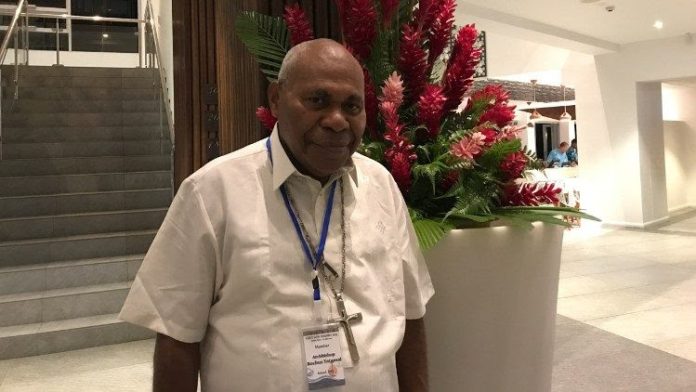By Sr Bernadette Mary Reis, fsp (Vatican News Special Envoy)
During the Oceania Continental Assembly taking place in Suva, one emerging theme is “the question of theology in the Pacific world,” as Archbishop Mark Coleridge of Brisbane, Australia, acknowledged.
In sessions on Thursday, he described this as the need for a “a distinctively Pacific voice or symphony of voices” is emerging slowly. “Theology in this part of the world,” the Archbishop further explained, “is based upon a different set of facts than in other parts of the world.”
Expanding on that, he noted that this voice would include “Western theology that has been exported,” but also a “theological enterprise applying reason to faith in a way that does justice to the experience of the peoples of the Pacific.”
Missionary of the Sacred Heart Archbishop Rochus Tatamai, of Rabaul in Papua New Guinea, spoke to Vatican News to offer his insights on the synodal process in his Archdiocese. He also how certain aspects of the faith can be explained using aspects from Melanesian culture.
Island experience of consensus
“The [synodal] experience is somehow confirming our own traditional process. Melanesians, as we know ourselves, these are the black islands. So, we talk about the West Papua to Papua New Guinea to Solomon Islands, Vanuatu, Fiji and New Caledonia,” he said. “These are the Melanesian Islands, and there is one strong aspect of decision making – consensus. Consensus is when everybody gives their contribution. And this is what we call a Melanesian way, which sometimes can take a long time in just talking and talking and talking and talking and listening and then at the end, there’ll be a decision made. Somehow, we can say that the decision that we have to make, we know we’re going to do it, but somehow we just allow for the process to allow everyone to take part, to talk and that’s our Melanesian way of doing things.”
Melanesian concept of salvation
“I’m approaching this whole reflection from the Melanesian worldview, the Melanesian worldview, as one of our Divine Word Missionaries, Rev. Ennio Mantovani, he actually had some study amongst the Melanesian Islands,” continued the Archbishop. “And he found that amongst us, the Melanesians, there are what we call value systems that are in place, and that’s strongly about life. And life is in English, we say it’s a well-being and salvation. But in the pigeon context, we call it gutpela sindaun. Gutpela sindaun literally means that you are just sitting down properly, in balance, equilibrium. And that’s what we talk about when it comes to the Melanesian worldview is that life that we quest for is the balance. And when the balance is in place, the equilibrium is in place, everything is in harmony. Everything is going very well….”
Web of relationships
“And community is one big aspect. So, we have life as it is. It is gutpela sindaun, well-being, salvation. And then it’s supported by the community. And the community is a web of relationships. And this community has to do first and foremost with the blood relationships, the family – the father, the mother and the children, the daughters and sons. This is the first level of relationship which is based on blood. That’s a family.
“And then you go into the next level of this relationship, which is in-laws through marriage. So, the marriage that takes place when you marry someone, you not only marry that individual, but it’s the whole tribe that comes in to expand your community from being a family unit now to an extended family….
“Now, from the family, to the in-laws, you now make reference to those who have gone before us, our ancestors. And we have also a deep consideration for them. And then after the ancestors, you now have a relationship with your environment. And in Melanesia, we don’t have such a thing as an empty space, or an empty time. We do have the concept of a sacred time and sacred space. Which means that whenever you are at home, you know that you are part of a family, you have in-laws in place, and you have the ancestors that are still influencing your life, as well as the environment that you go through to get down to the river, into the bush, the reefs, the seas.
“There’s always a communication there that, since you are always there, you don’t really pay attention to. But especially when we have visitors coming in, or strangers are with you, you as a person have to almost introduce these people that these are not strangers. They are part of you. And to allow the environment there – whether it be the bush, the jungle, the beaches, the river – that these people are our friends and are with us. It’s almost saying that no harm should come to them”.
How tension is resolved
“Now we do know that as families – as much as in-laws, with the ancestors, and the environment – as human beings, there are always some tensions that go on, or we may say that relationships go wrong…. There’s always the consciousness that when somebody is sick, you never ask the question, ‘What happened to this person?’ It’s always the question, ‘Who caused it? Who caused this disease?’ It’s always a question of making reference to whether it is the environment, or is it the ancestors, or is it disagreements in the family? Are there conflicts, divisions? – all of these. And therefore, when it arises, when imbalance comes, there is conflict, there is opposition, sickness, death. And when natural disasters happen, there is always a need to do something together, to be able to bring back everything to the balance, to the equilibrium.
“And that is the value that we always refer to as an exchange. And this exchange means that everybody is part of it, and everybody has to be engaged on equal terms. Physically and practically, it may mean that if I am with somebody in a family, or part of the in-laws, or part of the environment, or part of those who have passed on (the ancestors), and something is not right, then I will, let’s say, put up a pig. And when I put up a pig to go into a reconciliation – to go into an exchange – somebody else would have to put another pig. And so, when we exchange the pigs on equal terms what happens in the end is I have a pig – but it is not mine, it’s his – and he has my pig. And that should be able to strike a balance so that there is equilibrium, there is once again a balance, and so life in abundance comes back.
Connectedness to the land
“And this is how we’ve been seeing it. So, when there are big winds or big seas, or floods come, there’s always a question that something is not right. Let us make a reconciliation. So, it is based on this relationship. So, you never sell your land. You never part with your land. You can allow people to use it, but it comes back to you. And you are not individually owning that land – it’s the tribe’s, it’s the clan’s – because it’s the communal ownership of it. And that is why we don’t use them. We don’t own the land; the land owns us. And because of that we should have respect for it. We should have regard for it because it is – as it came out with the Maori prayers this morning, and how the bishop made reference to it – our identity. You have to call your name, and your mountain, and your river, and this is always something basic in Melanesia and Micronesia, Polynesia in Oceania….
“The attachment to the land and that sense of who you are is because of the land that you have. And so, you relate with it. You do not abuse it. You don’t use it. And systematically, when the big fishes happen, it’s the eldest, the elderly who tell us, ‘You don’t fish here. You don’t do any activities here for the time being. You do it elsewhere because we will need the fishing here, or the gardening here at that time.’ And so, I think there has been an ancient wisdom for sustainability always there.
Imbalance with a market economy
“Now with market forces, and logging and all the rest and money coming in, you don’t observe these things anymore. So, we are a living a bit of a turmoil in all this. And of course, reconciliation when it comes to exchange, unfortunately, in our case in Papua New Guinea, we have really corrupted this whole gift of exchange. And we have introduced what we now call today compensation. And compensation is a big imbalance where maybe they pay some money to you, but they ones who are giving the money. They don’t feel good because they pay out a lot and you pay nothing back. Whereas in the exchange system you have to offer something back, and sometimes in equal terms. And you know that everybody has been part of it. Compensation causes an imbalance. And then after that, it also initiates a cycle of violence.
“And this is something that we are still trying to fully understand and say if it has to be a compensation, it has to be properly understood that it is just. But how do you measure what is just – given that it has to be given by one person and the other is on the receiving end. And so, we still think that with the whole concept of the environment – the land, the sea, the mountains, everything – there’s a deep relationship there. And I think it’s what we need when we’re talking about sustainable living. And when you talk about Laudato si’, it is calling for an ecological conversion for us, it just simply makes sense. And it is very easily understood when you talk about the psychological conversion.”
This interview will be continued in a second article regarding the application of the concept of gutpela sindaun and exchange to Catholic beliefs.
originally published at https://www.synod2023.org/blog/2023/02/09/synod-confirms-traditional-melanesian-process/



